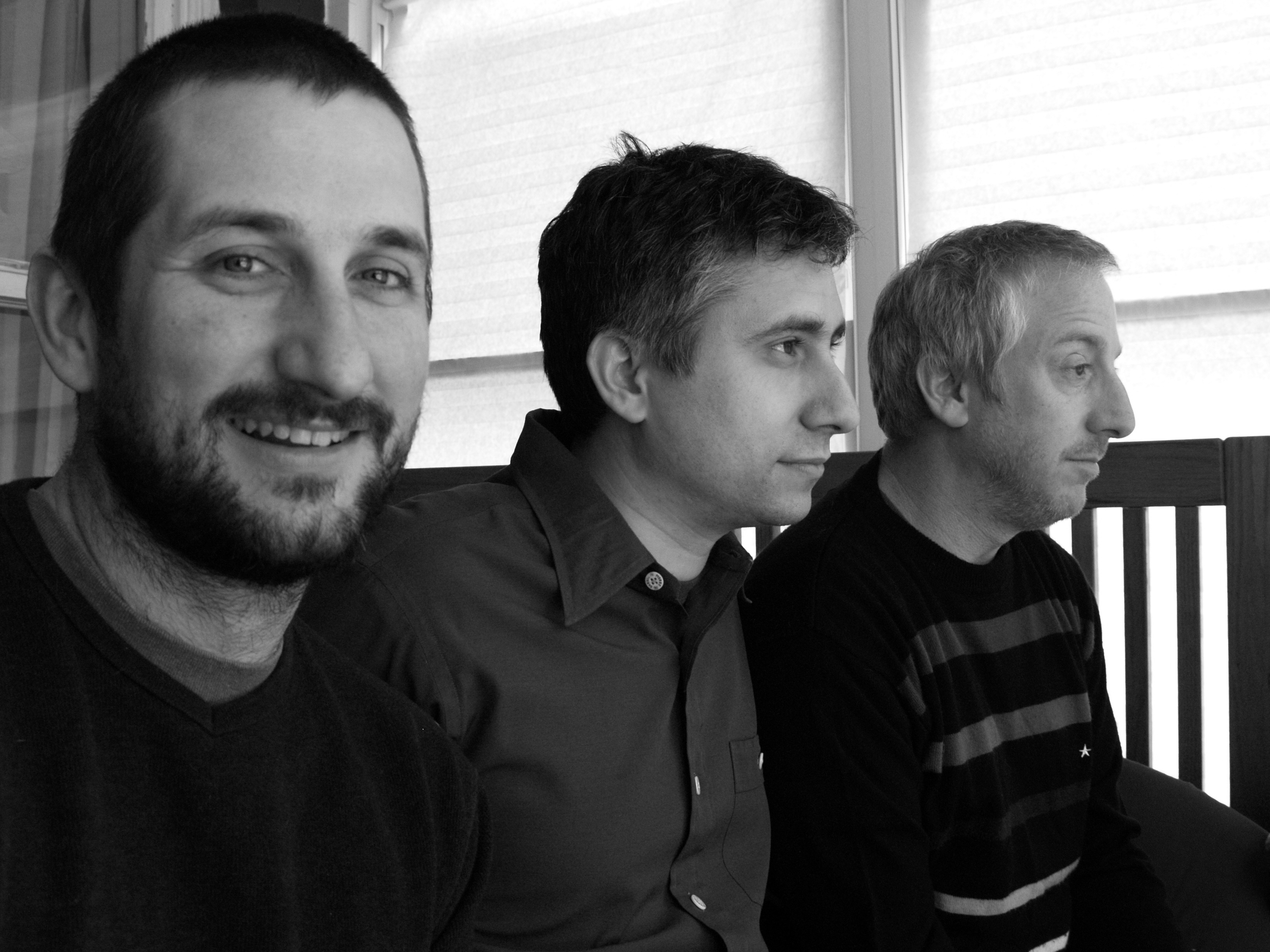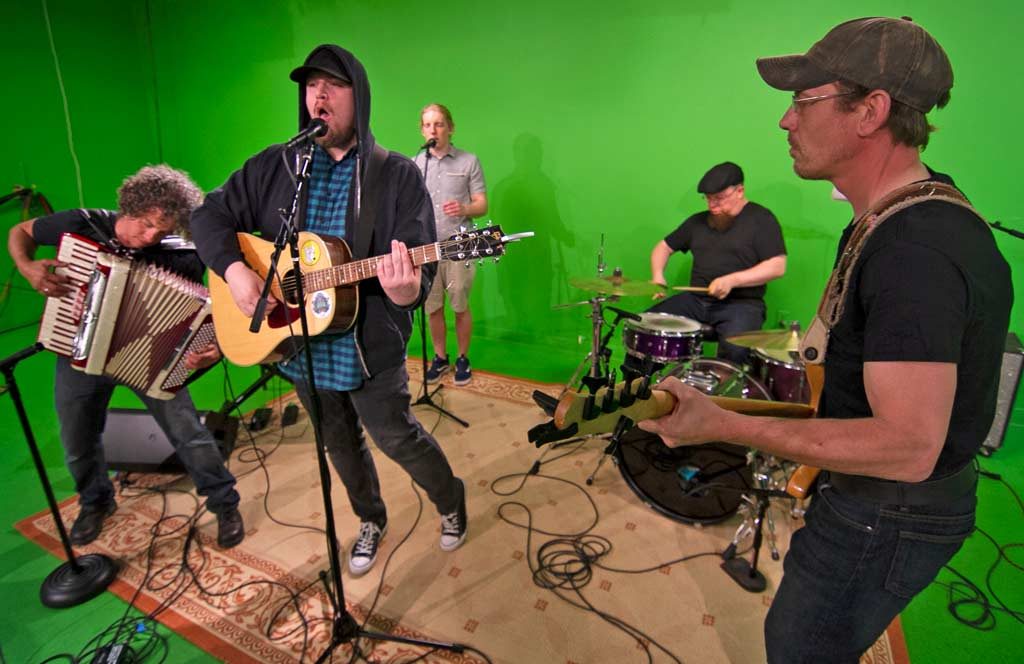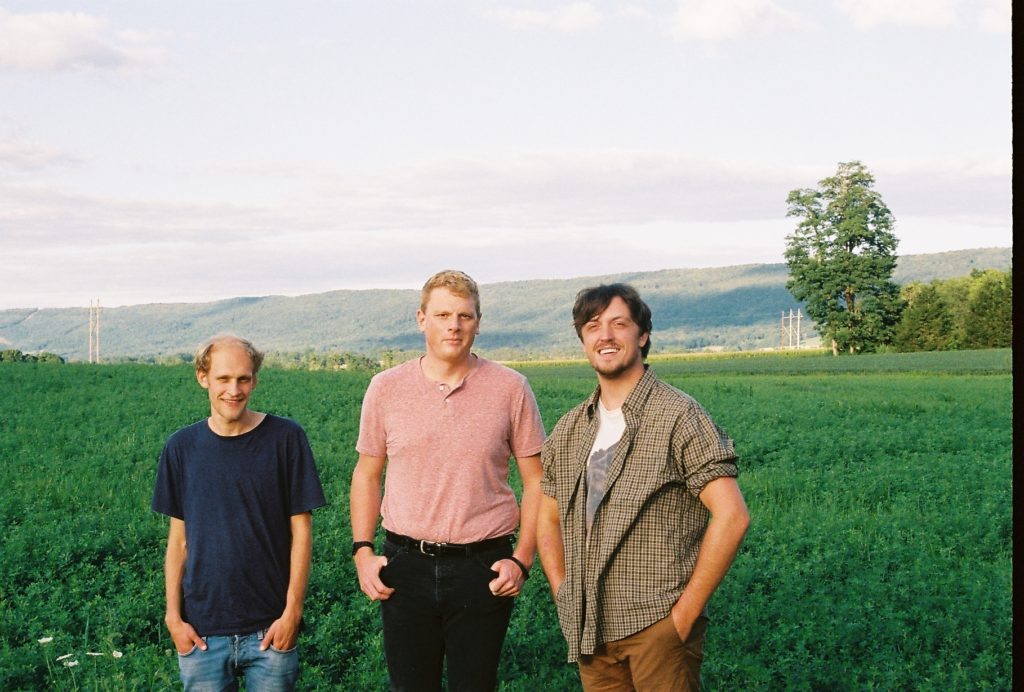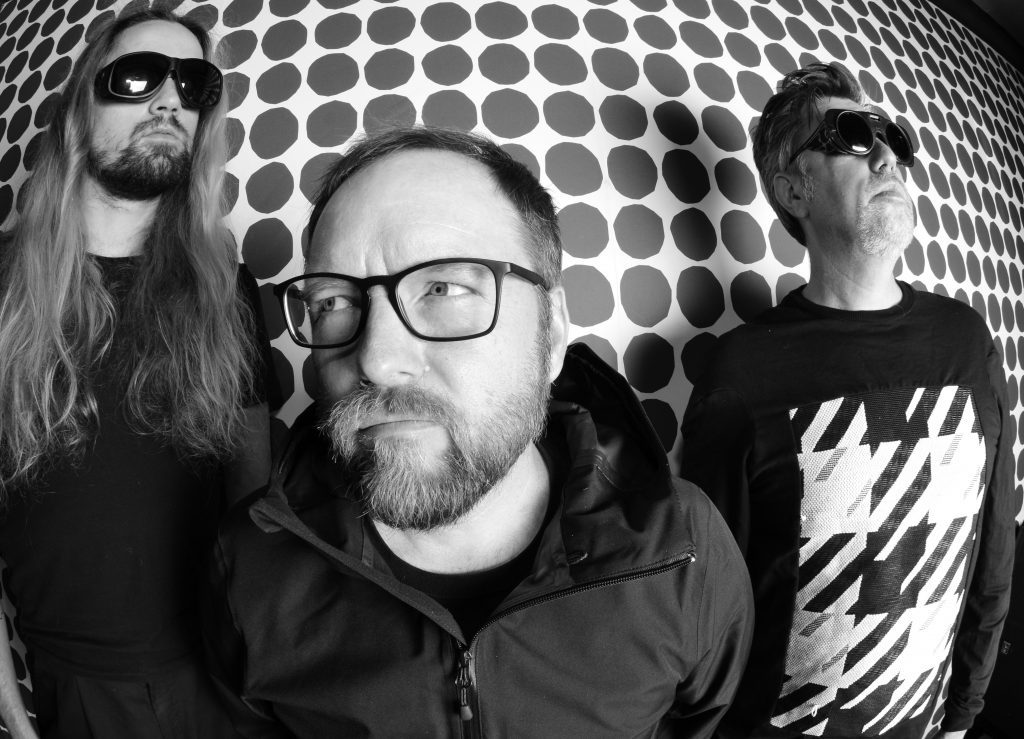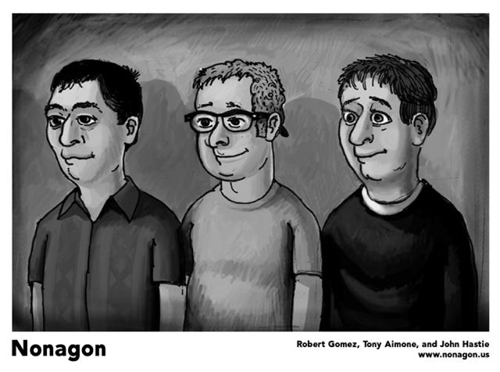 Originally published in Delusions of Adequacy June 1, 2009
Originally published in Delusions of Adequacy June 1, 2009
Nonagon’s songs have a way of popping, no, better yet, of exploding out of stereo speakers, as if they were bottles of pressurized soda water just itching to be uncapped. On No Sun, their self-released and hand-assembled debut CD, angular guitars tear through the landscape, bass and drums lunge back and forth, and a barked refrain is never far away. The moment on the title track when frontman John Hastie screams “No sun! No sun! No sun!” might be among the most adrenaline-fueled moments of 2008. The record leaves an impression. And it’s only 15 minutes long. Delusions of Adequacy recently got the chance to exchange e-mail with the trio – bassist Robert Gomez, Hastie and drummer Tony Aimone – and talk about interesting names and what it means to be a punk band from Chicago.
Delusions of Adequacy: So, what’s the connection between a nine-sided polygon and a post-punk band? And do you mind if I call you a post-punk band?
John Hastie: The name was chosen with some degree of randomness. It was the first not to be vetoed by one of us. That said, I guess there are some happy accidents: We, too, are divisible by three. We seem to have a proclivity for odd-numbered time signatures (although I don’t think “9″ has happened yet), and it sounds fantastic when chanted by thousands of fans en masse.
Post-punk is fine, I guess. When asked, I just end up just defaulting to “punk” almost immediately. It’s a convenient answer to the “what’s-your-band-like?” question because it’s a term that has lost most of its specificity. Folks are satisfied with the answer because they immediately attribute their own set of assumptions and baggage to it.
Robert Gomez: Yeah, our previous #1 choice for a name was a made up word. However, a few months and several random web searches later, we discovered some hardcore band had came up with the same unlikely combination of letters before us. That’s when we fell back on randomly pointing to words in a Spanish-to-English dictionary.
Tony Aimone: In my mind, we’ll always be called Brown Sabbath. Nonagon was just a name that the other two nerds in the band could understand and relate to. Since we came up with Brown Sabbath back in ‘92 there have been countless other bands with that name. But it’ll always be ours. Always.
DOA: Let’s talk more about “defaulting to ‘punk.’” How much of what you guys do is filtered through the music, some of which you could call punk, that’s come out of Chicago in the last 20 years? How much are you a product of the region?
RG: I didn’t start playing in bands or going to shows until I was in college down in Champaign-Urbana in the early 90s. A large chunk of what I saw were either Chicago bands or student bands comprised of Chicagolanders who were reared on bands like Big Black or Naked Raygun (unlike myself who was reared on Dr. Demento and Casey’s Weekly Top 40). So, I literally learned to play music in this environment or scene, or whatever you want to call it. And I suppose that sound will always pervade much of what I bring to Nonagon.
JH: I guess it would be a pretty obvious lie to claim we weren’t influenced by a bunch of the stuff we were listening to when we were considerably younger. It’s like what they say about a person’s clothing choices: they tend not to stray too far from the stuff they wore when they were at the happiest point in their lives. I guess you just have to wear it unapologetically, hope you wear it well and try to do something fresh with it.
So yeah, for me it started with a pretty steady diet of Naked Raygun, Big Black, The Effigies and a dozen other bands from Chicago that would play all ages shows in the mid-eighties. Then, of course, Touch and Go blew it all wide open. At the risk of sounding corny, it was an incredibly exciting time and I still think it’s inspiring.
I think it’s fair to say that what Nonagon is doing now might have begun there, taken strolls through Dischord and SST, and spent a chunk of time in 90s Illinois college towns (another exciting time). But it’s also been informed by a ton of what we’ve absorbed since then, which is to say, a lot. We’re kind of old. Don’t tell anybody.
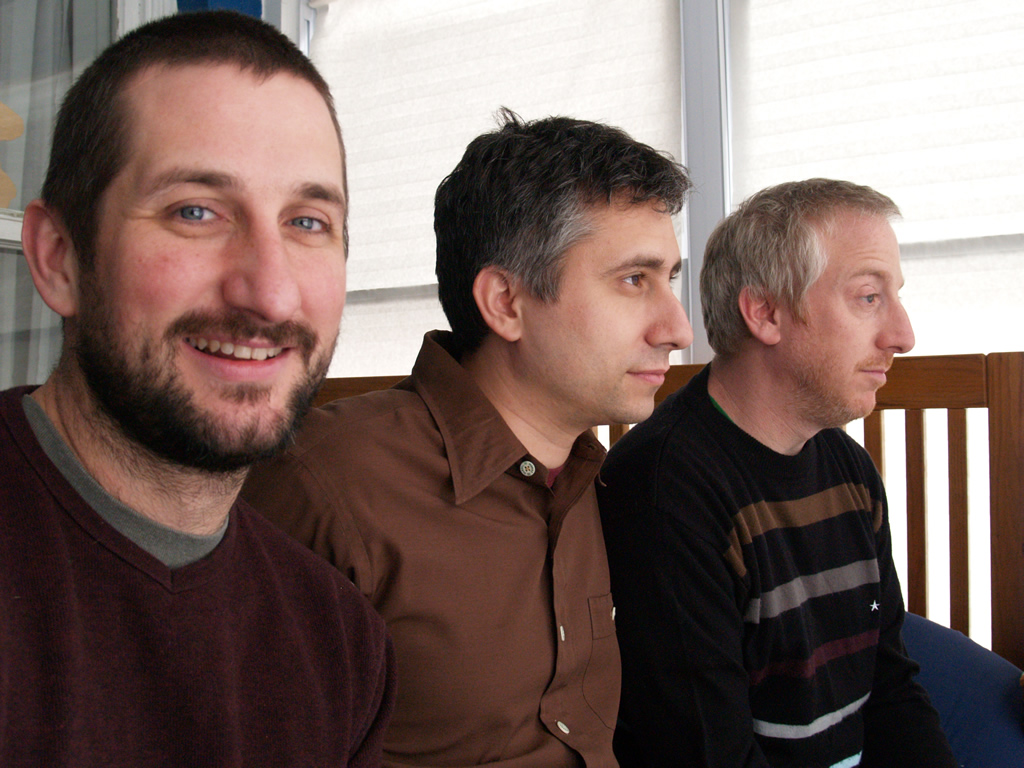 DOA: Tell me about the history of the band. When did you guys form and how? For how long were you playing before you ventured into the studio for the EP?
DOA: Tell me about the history of the band. When did you guys form and how? For how long were you playing before you ventured into the studio for the EP?
JH: It’s been something like five or six years ago at this point. Tony and I had played together in the latest of my “one-show-and-out” bands along with our friends Brian (who used to be in the Baltimores) and Mark (who is now in an amazing band called Neptune out of Boston).
I had pretty much had a long string of those short-lived projects ever since the mid-nineties. I could never seem to find a group of folks with whom musical kinship was balanced with social compatibility. For example: I briefly brushed a snare drum and sang high-lonesome harmonies in a bluegrass band in Kansas. I loved the other folks in the band, but it was obviously pretty far from where I prefer to sit musically.
When Mark moved to Boston breaking up The Metric System, Tony and I realized that we seemed to be on the same page. I had recently run into Robert after years of not seeing him and remembered that he was a pretty great bass player so we kidnapped him from his wife (who seemed eager to get him out of the house, frankly). It kind of replicated what, up to this point, had been my most fertile and comfortable place to be: collaborating in a loud trio with like-minded folks who at least pretend to stand my company.
I’d love to report that things moved quickly after that, but we decided early on that trying to force the band on our families, jobs, etc., might make it a source of tension, so we practice, play shows and record when we can squeeze it into our “adult” lives. This means occasional periods of inactivity (sometimes a couple of months long) followed by spurts of frenzied band-ness (like the one we seem to be in right now).
DOA: Tell me more about when and how you pieced together the EP. And how conscious of a decision was it to self-release it?
JH: There was never any real doubt that this would be a self-release. Pretty much every decision was made with that in mind. There are really great and trustworthy labels but the equation seems stacked against the whole endeavor: Nobody with any scruples is making much money in this milieu and there are a ton of really good bands worthy of exposure. For small labels, that means there are a lot of attractive-but-risky prospects out there, bands they love personally and creatively that they’d like to support but who may not be “wise financial investments.” Add to that the fact that the ever-dwindling audience for live rock, and the picture isn’t pretty.
From the beginning we decided that we really didn’t want to be evaluated by anybody (especially friends) based on our potential rate of economic return. It can create weirdness and regrettable decision-making.
With that in mind, we went into the recording of the EP the same way we’ve approached the whole band thing: as a hobby, a cathartic, expensive, obsessive hobby that we take seriously, but a hobby all the same. Someone might think that sounds like we’re not dedicated, but the way I see it: keeping the band removed from our food chain means that we’ll only make decisions based on what we owe it and what we get from it.
So we waited until we had some money saved and then recorded and assembled the EP based entirely on our own desires and limits. We worked with the folks we wanted to work with, packaged it the way we wanted to package it, made it the length we wanted it to be, priced it the way we wanted to, had to find our own workarounds for snags, etc. But really, once we made the decision to actually start the project last August, it didn’t take too long before we had an actual, finished, debut CD in our hands.
That said, there are some things I would’ve loved some label-like support with: Sending out copies to radio stations, ‘zines, Web sites and venues. Booking out-of-town shows. Finding distributors and stores who would agree to stock the EP. Cutting, folding, gluing, and stuffing the sleeves, etc. Doing it all from scratch — and without the “cred” of the right label or distributor — has been challenging and has taken a long time.
What’s great is that we’re discovering that there are still some folks here and there who will take a chance and listen to the occasional unsolicited CD in their mailbox.
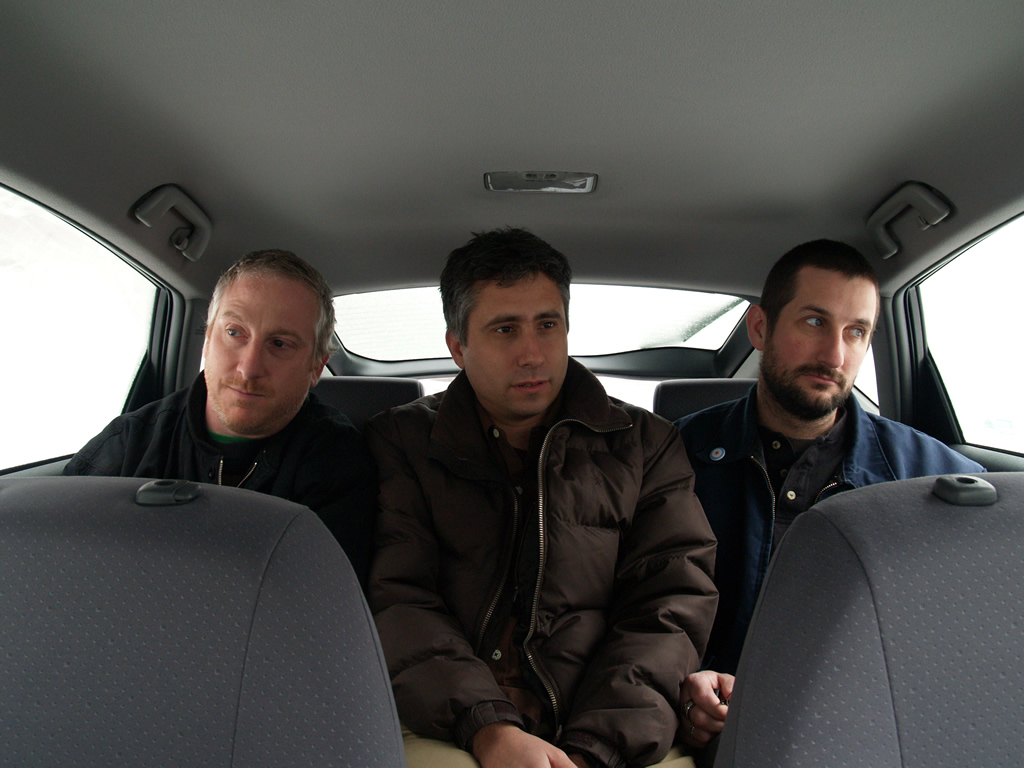 DOA: You can count me among those open to unsolicited recordings. So, what’s next for you guys? Does the hobby nature of things keep you from planning too far ahead when it comes to tours, new records, and so on?
DOA: You can count me among those open to unsolicited recordings. So, what’s next for you guys? Does the hobby nature of things keep you from planning too far ahead when it comes to tours, new records, and so on?
RG: Getting the CD together gave us a chance to hear some of these songs that we had been tooling around with for a few years finally come together, and it has gotten us itching to do more. Lately our practices have been more about creating new songs and trying some different things rather than simply burning through our set list. There has even some preliminary discussion regarding our next recording.
That said, the hobby nature of the band does limit our scope a little bit. As much as I would love to create an epic double-disc concept album, we realize that it’s just not possible given our lives outside of the band. I think we are happy with the idea of releasing an EP every year or two and traveling out-of-state occasionally on weekend micro-tours.
So, the band is planning and moving forward. But things just happen to be moving on more of a geological time scale.
JH: Life intervened right after our EP release party causing an immediate hiatus and pretty much killing all momentum. Now that we can play again we’re making the most of it with a nice flurry of activity: writing new songs (the next EP is pretty much covered), and setting up shows (in and out of town). The hope is that we make at least two steps forwards for every inevitable step backwards and integrate this unwieldy thing ever-more-regularly into our lives.
By the way, anybody booking a show within five hours of Chicago should track us down.

